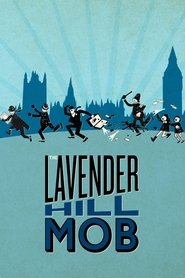Like all British films, The Lavender Hill Mob insists on being read through the lens of class. Here, it suggests a kind of convivial solidarity between classes is both possible and perhaps even admirable insofar as that any such groupings are temporary and do not upend the social order. In that sense, these Ealing Comedies are more similar to the more 'arty' films by Powell & Pressburger than might first meet the eye, although I would easily concede that all of the Archer's films were a distinctly more subversive, but never quite revolutionary.
So Holland assumes his rightful, natural place at the head of the 'mob', a position that the film doesn't appear to question or interrogate. It is true that the gang shares the work to a certain degree, but Holland and Pendlebury are loth to trade various poems and middlebrow references to Shakespeare, thus undermining the way they are going about it. The gang celebrates in that distinctly upper-middle class way: not going down the ol' boozer, but by taking a dining room at some private club instead. Yet… what actually motivates Holland? In my reading, Holland wants what everyone in his particular class position craves: not material advantages such as money per se, for he seemingly has enough of that. To be more precise, what he desires is rather what the class above him, the aristocracy, already possesses: prestige and respect. Holland sees himself, to turn a phrase about the United States on its head, as a kind of 'temporarily embarrassed aristocrat'.
Indeed, it is salient to note whilst two kinds of working class and two middle-class sensibilities are represented, there is no representation from the aristocracy. The police and the other apparatus of state (e.g. the Bank of England) represent the establishment to a certain degree, and this is underscored by the rather cynical aside by Holland's boss that he "has no imagination, no initiative" — the diegesis shockingly suggesting that dishonesty is a necessary if not sufficient condition to joining the managerial class! But, indeed, there is no Duke helping the team out, and the idea that there could be seems somewhat farfetched. What could some kind Earl possibly get out of joining such a team, apart from a kind of unfamiliar adventure, an episode for Bertie Wooster to 'slum it' with a bit of nostalgie de la Bromley-By-Bow.
The Lavender Hill Mob is often seen as a gentle caper comedy, but wrapped up inside this genre piece is a powerful fantasy of escape. Stanley Holloway and Alec Guinness, the film’s partners in crime, are at heart romantics and dreamers chafing to break free from the conventions of postwar Britain in all its drabness, austerity and repression, and Continental Europe provides the closest escape route (even the name of Guinness’s character – Holland – gestures towards this). The film’s most lyrical and dynamic sequence takes place in Paris, where the couple scarper in order to dispose of their stolen bullion; at this point Auric’s score becomes a crucial component of its zany Francophilia. And when Guinness and Holloway career down the Eiffel Tower via a spiral staircase and emerge spinning and delirious, they are consumed by the one thing that life in the mother country has been denying them above all: laughter. Helpless, shaking paroxysms of it. The music reaches a pitch of Gallic delirium and we are brought to understand that if we are really going to laugh, both with ourselves and at ourselves, we must first escape ourselves. To attain what is apparently the essence of Britishness, Guinness and Holloway have to become profoundly un-British.

